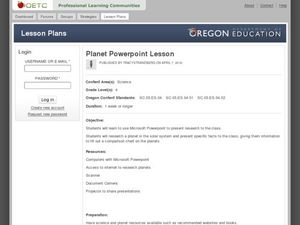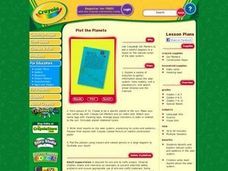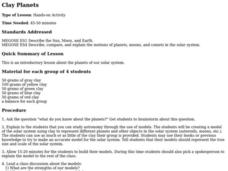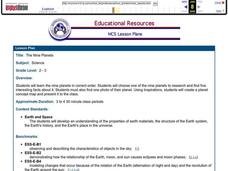Curated OER
Planet PowerPoint Lesson
Looking for a good, technology-based science lesson for your 3rd graders? This lesson is worth a look! They will utilize PowerPoint to create a presentation for the class on a planet of their choice. They also use document cameras, a...
Curated OER
Planets in our Solar System
A wonderfully designed, and very thorough lesson plan on the planets in our solar system. Designed for third graders, this lesson has learners use technology and multimedia tools to research, explore, and create information about the...
Curated OER
Planet Data
Sixth graders use various resources to locate information for a database (name of planets, diameter of planets, etc.). They enter the data onto a prepared data grid. Use of Access to sort data is accented within this lesson plan....
University of Colorado
Looking Inside Planets
All of the gas giant's atmospheres consist of hydrogen and helium, the same gases that make up all stars. The third in a series of 22, the activity challenges pupils to make scale models of the interiors of planets in order to...
Science 4 Inquiry
Temperature of Inner Planets
Mars, Earth, and Venus contain atmospheres that generate weather. Young scientists explore the temperature of inner planets. They create a model simulating the greenhouse effect before researching and answering guided questions to...
Curated OER
Describing the Planets
Kids love learning about space! In this short plan, your young Spanish speakers read Los Planetas and talk about the nine planets. By the end, they should be able to name and identify each of the planets and add some descriptive words....
Curated OER
Planets in Our Solar System
Each member of a four-student group takes on a specific aspect of an assigned planet to research. After gathering information, the team works together to create a travel brochure and a presentation intended to convince other classmates...
Teach Engineering
The Amazing Red Planet
Introduce your class to Mars with a resource that provides information about its size, location, length of day, length of year, number of moons, and average temperature. Also includes is information about the lans for past...
University of Colorado
Looking Inside Planets
Researchers use scientific data to understand what is inside each of the planets. The first in a series of six, this lesson builds off of that concept by having pupils use a data table to create their own scale models of the interiors of...
Virginia Department of Education
Planet Line-Ups
Should Pluto be considered a planet or a dwarf planet? Scholars research planets in our solar system to understand their similarities and differences. It also includes memory activities related to the order of the planets.
PHET
Planet Designer: What’s Trending Hot?
Excite scholars to design their own planet in this first of five lessons. The lesson plan starts with a pre-activity assessment, a complete lesson plan that is easy to implement, and a post-activity assessment that would look great...
Curated OER
Planets Beyond
Students recognize basic geometric shapes. They research the positions of planets in our solar system and find information on early theories about the location of planets and the sun. Students visualize planets as they might appear in an...
Kelly's Kindergarten
Kelly's Kindergarten: Names of Planets
Need some helpful images for your astronomy unit? Check out a slide show that hosts several pictures of planets with their names.
Curated OER
Plot the Planets
Students identify and explain natural cycles and patterns in the solar system. They write short reports about the solar system. Students plot the order of the planets in a colorful diagram. They use Crayola Gel Markers to add a colorful...
Curated OER
Describing the Planets
Young Spanish language learners review the names of each planet. Then, in pairs, they work to complete the chart provided. What is the composition of each planet? What is the color? They learn how to describe the planets.
Curated OER
Clay Planets
Have your class learn about the solar system using this hands on technique. Learners review what they know about the planets, and create a clay model of the solar system. There are a list of resource links to make this lesson a complete...
Space Awareness
Know Your Planets
Does your class know their planets? Implement an activity that has them describing the solar system, identifying properties of the planets, and placing them in order from their distance from the sun.
Curated OER
Nine Planets
What are characteristics of a planet? With this plan, learners investigate the characteristics of the planets in our solar system. They gather research of the nine planets by using the Internet and other research tools. Then they create...
Curated OER
Introduce Vocabulary: I Am Planet Earth (Marzollo)
Explore the world's beauty with Jean Marzollo's colorful book I Am Planet Earth, the context of a vocabulary study focused on the following in-text words: globe, jungle, paddy, planet, and valley. Discuss the...
University of Colorado
Modeling Sizes of Planets
The density of the huge planet of Saturn is 0.7 g/cm3, which means it could float in water! In the second part of 22, science pupils explore the size and order of the planets. They then calculate weight and/or gravity and density of...
Laboratory for Atmospheric and Space Physics
The Planets and Scale
Scholars gain an insight into the relative size of planets and distance between inner and outer planets with the help of informational text, a data table, and a series of four questions.
PHET
Planet Designer: Kelvin Climb
It's time to get those creative juices flowing! This second lesson in a series of five continues allowing pupils to design their own planets. It the same format as the first, but, this time, allows students to alter greenhouse gases...
Curated OER
The Nine Planets
A solid instructional activity on teaching the nine planets in our solar system is here for you. In it, young scientists learn the correct order of the planets, and they choose one of the planets to do a research report on. They must...
Laboratory for Atmospheric and Space Physics
Goldilocks and the Three Planets
Venus is the second brightest object in the night sky after the moon. Here is an interesting lesson that explores three planets — Venus, Earth, and Mars — specifically their surfaces and atmospheres. Through an analysis of their spectra,...
Other popular searches
- Lesson Planet
- Planet Earth
- Inner and Outer Planets
- Worksheets Planets
- Paper Mache Planets
- Inner Planets
- Nine Planets
- Planet Earth Dvd Series
- The Planets
- Imaginary Planets
- Planet Acrostic Poem
- Laws of Planetary Motion

























